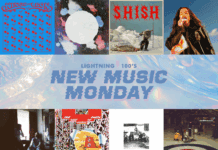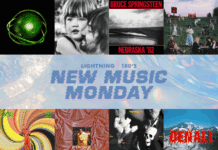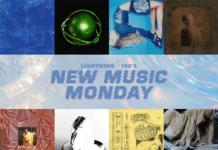

When it came time to begin work on the seventh album, Gourley thought long and hard about the next move and kept coming back to one concept: The most satisfying work is collaborative work. From building houses with his father in Alaska to building a devoted fanbase, he had sought partnerships. So he took a bold step — bold for a proven band, bolder still for its uncertainty of sound — a step up to the apartment of a possible collaborator, Danger Mouse.
“I walked into his place,” Gourley remembers now. “And it wasn’t going to happen. He was like, ‘Hey, man, just so you know, I don’t really want to record a rock band.’ And I was a little relieved. We’d done this by ourselves before, and we knew we could do it by ourselves again.”
But then they got to listening, and to talking about how much Danger Mouse had loved In the Mountain in the Cloud — the 2011 followup to Portugal. The Man’s break out record The Satanic Satanist. “From that very first meeting,” says Danger Mouse, “we were very ambitious about what we could do…otherwise there was no point. So we decided: Let’s try and make something really special.”
So Danger Mouse — aka Brian Burton, the five-time Grammy award winning producer behind everything from Gnarls Barkley and Beck to The Black Keys and now U2 —and the band agreed that they were game for the challenge and began production on what would become Evil Friends, the undaunted re-awakening for Portugal. The Man. As much as their collaborative imaginations melded, to construct songs that lived up to the ambitious visions they had would take some time. After all, here was a band with an evolving lineup — Kyle O’Quin on keyboards, Noah Gersh on guitar/percussion/keyboards, and Kane Ritchotte on drums joined Zach Carothers on bass and vocals and Gourley on lead vocals and guitar — building new songs with a new producer trying to do something neither of them had done before.
They went, together, to Los Angeles and worked through several sessions — at Mondo Studios, Eltro Vox Studios, and Kingsize Soundlabs. The band worked months longer than they ever had on one thing. And somehow — maybe it was the collaboration in the air, or maybe sheer will — they finally stopped searching and started realizing: “What really brought our record together was getting past that period of looking for something, and figuring out how to do something really new, really hard, and really satisfying,” said Gourley.
Each track on Evil Friends is as different from the next as Portugal. The Man’s previous records were from each other, which is to say a piece of a growing mindscape, and wholly a part of the group’s tumbling fever dream. Where the 2009 hit “People Say” was a cheery guitar rally, the new title track is a bells-and-balls ballad emerging from darkness into a pipe-whistling punky thump, albeit with Gourley’s trademark falsetto and thundering guitar. And yet here is Evil Friends swirling, like a tornado that sends a napping child toward Oz, into something of a tale of Portugal. The Man’s arousal from when it decided to make something special to when it actually did: The weighted down questions of “Plastic Soldiers” (Could it be we got lost in the summer? / Well I know you know that it’s over) give way to the confident melodies of “Modern Jesus” (The only rule we need is never giving up / The only faith we have is faith in us) and finally, brazenly, to the anthem “Smile” (We watched the sun come up / But took it down to hide it / Seems like the spring has come and gone / It felt like forever).
It took all year, and Portugal. The Man — a group guaranteed for seven years to pump out a record, to tour and tour and tour, to tuck its fans to bed at night with a community of psychedelic rock — had learned to slow down and transform all-day, all-night recording with Danger Mouse into adrenaline, into words that are at once dark and light, into sounds that are overlapping with danger and charm. The whole “evil friends” thing was just a happy writing accident, by the way, a lyrical coincidence belying a collaborative friendship Burton says taught him, too: “I felt like I was watching them do something special and I wanted to let them do it, so sometimes I was more hands-on, but sometimes more hands-off than I had been with anyone,” says Danger Mouse. “They had done enough albums that I thought it would be fun to shake it up a little bit.”
“In the beginning, I asked Brian why he had wanted to talk about making a record,” recalls Gourley. “And he admitted that he was surprised when he saw us live. ‘I didn’t know you guys could sound like that.’ There had been this perception that we’ve been something else — and I’ve noticed it, at festivals, everywhere — that we were something we were not. But then we got in a room with Danger Mouse, to the place where we could just throw that out, wake up and say, Here we are. We’re this band! Let’s just make it, together.”






